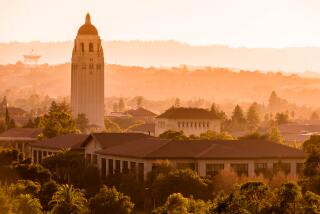Private Persuader : Larry Janss Avoids Civic Spotlight, but Is in Thick of Arts Center Issue
- Share via
Larry Janss, a descendant of one of the founding families of Thousand Oaks, usually stays clear of city politics.
“It’s like hitting your head against a brick wall,” explains Janss, the owner of the Conejo Village Bowl and Janss Village shopping center.
But recently, the reserved heir to the Janss development dynasty found himself speaking out on the controversial Civic Arts Plaza.
Janss, who says a civic arts center is a “desperate need” of the city’s, publicly criticized city leaders for not taking the project back to the voters when it looked like the city might have to borrow money to finish construction on the $63.8-million center. Voters originally approved a plaza financed entirely by existing funds.
“ ‘Let’s let democracy reign,’ is how I think I put it,” Janss said.
He said he soon felt labeled an enemy of the Civics Arts Plaza, a turncoat bashing the city.
Despite his protests, the center continued to “rise up out of the earth,” Janss said. So he decided that what he could no longer fight, he would try to improve. He soon accepted a position on the Civic Arts Plaza’s advisory commission.
And last month, he persuaded family members to donate $250,000 to the civic arts center’s endowment fund--the largest private contribution so far.
Janss, 43, said he is a reluctant public servant and that he basically wants to mind his own business.
“I’m really a private person,” he said. That’s not always easy for someone whose last name adorns freeway exit signs, a shopping mall and other local landmarks. Or someone who was raised on the family’s 10,000-acre Conejo Ranch that would later become a key part of Thousand Oaks.
Larry Janss is the fourth generation of the fabulously wealthy Southern California family known for its business acumen. Since 1910, the Janss family has developed an estimated 90,000 acres across the state, including portions of Westwood, Monterey Park, the San Fernando and Imperial valleys.
But members of the family that donated the land for UCLA and the first Thousand Oaks City Hall often found success following unusual paths. And Larry Janss has followed his family’s tradition of nonconformity. His great-grandfather, Peter Janss, was a physician who left medicine for development. His father, Edwin Janss Jr., was a passionate amateur photographer and collector of pop art.
The life Janss leads today seems to merge his work and his artistic hobbies into one seamless whole.
The studio where he develops and prints his black-and-white photographs is up a narrow stairway from his business office in the Conejo Village Bowl.
The office itself is awash in striking, exotic artworks he has gathered on his journeys around the world--some of which relate to his efforts on behalf of the Janss family’s charitable foundations.
“He kind of constructs his own environment as he goes,” said childhood friend Marshall Milligan, now president of the Bank of A. Levy. “He has built a lifestyle unlike anybody else’s and it fits him perfectly.”
Occasionally, Janss dabbles in documentary filmmaking with movie director Saul Landau, a friend he met through his father. A television film the two made together in 1979, called “Paul Jacobs and the Nuclear Gang,” won them an Emmy Award for their depiction of a cancer epidemic in a small Utah town near a former government atomic bomb test site.
He has traveled around the world taking a series of striking black-and-white photographs of stark nature scenes. The photographs--which he has never attempted to sell--seem of a similar genre as those of famous photographer Ansel Adams, whom he studied with for three summers as a teen-ager in Yosemite National Park.
He runs various Janss family charities, including a School of the Pacific Islands foundation that provides grants for a wide variety of educational and cultural projects in Micronesia, Hawaii and California.
He serves as chairman of the Board of Trustees at The Viewpoint School in Calabasas, a private academy which his son Andrew, 9, attends.
And finally, he is the owner and operator of the bowling alley and the adjacent shopping center in central Thousand Oaks.
Some have called him a developer, but Janss bristles at the title. He said such a name belongs to his cousin Bill Janss Jr., the current president of the Janss Corp. Larry Janss says he would prefer to be called a businessman.
The Janss clan split in different directions when Larry’s father, Edwin, broke up family ownership of the Janss Corp. after the death of family matriarch Florence Janss in 1981, redeeming most family members’ stock for money or the ownership of various company assets.
As the years passed, the family had grown huge and unwieldy “and my father thought it was mentally unhealthy for us all to have shares in something that we had little control over,” Janss said.
In some ways, Janss has followed the pursuits of his father, such as collecting art and taking photographs.
From Janss’ viewpoint, his father was “amazingly dominant--he filled up the space.” Edwin Janss died in 1989, and his son recalls him as a man of strong opinions who liked to brag that he made Richard Nixon’s “enemies list” for his anti-war activities.
Janss seems to have inherited his father’s passion for politics--at least on an international level. The “seminal event” of his life, he says, was the five months he spent in Chile at age 19, helping Landau film a “combination documentary and fictional story” about the events surrounding the county’s first democratically elected Marxist government.
“My life was growing up in a cocoon of a 10,000-acre ranch,” he said. “I never saw poor people or currents of political unrest.”
Landau was especially sympathetic to leftist political parties, Janss said. “I’m finding myself in cell meetings with Marxist guerrillas, trying to fit in and be as quiet as I could,” Janss recalled. “I’m this vanilla, white-bread kid from Thousand Oaks, Calif., and I was just amazed at where I was finding myself.”
As a teen-ager, Janss dropped in and out of CalArts in Valencia before deciding college was not for him. “Larry was never a particularly diligent student, but he was always very bright,” Milligan said.
As a young man, he spent the next 14 years hopping from one career to another. For a while, he grew his hair long and raised goats in the mountains of New Mexico. But “you can only hang out in paradise so long,” he observed. “It got boring.” After a stint working in Southern California he hooked up with Landau again, this time in Washington, D.C.
The two taught a class in documentary filmmaking at the liberal Institute for Policy Studies and shot their own low-budget film. The project began in 1974 with the notion of creating a snapshot of Congress, but soon mushroomed into a political melodrama as the congressional Watergate hearings got under way. The resulting film, Janss said, eventually ran on public television.
From 1972 to ‘79, Janss supported himself with his co-ownership in “The Fabulous Fox--The Greatest Theater In The World,” a Venice movie theater that ran only low-budget movies that could get an airing nowhere else.
Janss and his business partners woke up one day in 1979 to the realization that their cherished theater--on which they had never kept any account books--was $100,000 in debt. “Debt’s a funny thing,” Janss said. Luckily, their debt was the same amount the theater was worth, he said. They sold the business and walked away without profit or loss.
“I was jobless,” Janss said. “What do you do when you are jobless? You go to work for your dad.”
At least you do if you are Larry Janss and your developer father owns a farming operation in Idaho. Janss spent the next two years directing the building of a fuel alcohol distillery for the farm. Finally, however, the mounting expense discouraged even his father, who had dreamed of producing his own fuel and running a self-sufficient farm.
So Janss, his new wife, Marney, and his stepson William, then 7, moved home to Thousand Oaks.
The interests Janss has cultivated since that move 12 years ago did not include local politics. His frustration over the handling of the Civic Arts Plaza construction finally persuaded him to enter the fray, he said.
More to Read
Sign up for Essential California
The most important California stories and recommendations in your inbox every morning.
You may occasionally receive promotional content from the Los Angeles Times.













